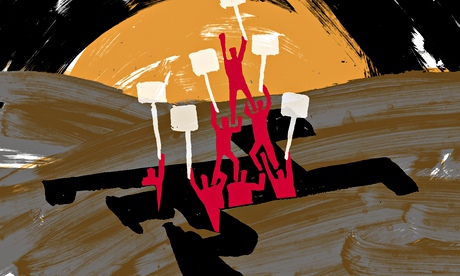
I’m trying to figure out why I loved Pride so much (the film, not the event). I don’t want to get too cultural studies about this – it’s mainly because it’s good. Yet I’m struck by the number of times I’ve sat sniffing in a multiplex over a film about the miners’ strike; the number of times we’ve revisited this clash in film; the magnificent performances, from Pete Postlethwaite’s lung-shot Danny in Brassed Off to Paddy Considine’s nearly-too-human Dai in Pride. This is no mere nostalgia trip – we don’t make films about CND (though, arguably, the world would be a safer place if we did).
OK, there are some elements of coal mining that make it seem very much of its time. What makes it such rich territory creatively is that it isn’t a straightforward clash of good and evil in which evil persistently comes out on top. Imagine how miserable that would be, sitting through Margaret Thatcher’s triumph, again and again, with no wider message other than “Thatcher triumphed”. I’d rather see Sex and the City Two.
Mining has this magnetic profundity (no, really), a tragic foreboding in the fault at its core: all heavy industry pitches identity, work and masculinity as a package, inseparable and insuperable. Lose one and you lose all three. That’s what gives these mass redundancies their emotional power, the fact that the jobs were more than just jobs; they were selves. But it’s also what gave unions such a giant problem dealing with contributions from lesbian and gay activists, and brass bands such qualms about letting in women.
This opens up complication in the characters, ignites the possibility that perhaps some of them were nicer people than others, that maybe some were victim and bigot simultaneously, that sometimes the hardest thing in life is to figure out which bits of modernity are progress and which are deterioration.
When I was growing up, we had a poster on the kitchen wall saying “support the miners”, another saying “nuclear power, no thanks!” and then something about how women were like mountains (old and strong, we went on and on. I’m not joking). We didn’t have anything about climate change because we didn’t call it that then, but certainly everybody knew about carbon emissions and anthropogenic global warming. The irony of campaigning to keep coal mines open, while at the same time rejecting nuclear power and worrying about carbon, went completely unremarked. And this does make the issue seem dated, passé even. I cannot imagine today being able to mention coal without anybody pointing out that it might be better to leave it where it is, jobs or no jobs.
And yet, at the centre of it all is this key enmity that isn’t dated: the fight between capital and labour. It is back with a vengeance, this struggle. It was a foolishness to think it had ever gone away. The weekend began with a promise to raise the minimum wage to £8 an hour. It sounds like a positive move, until you read the small print and see that it’s “by 2020”. Party manifestos have more and more in common with car rental agreements – two sentences of promise, 2,000 words in tiny type telling you what to expect really. It is extraordinary to consider that we now need a political party to promise a pay rise, six years hence; that it has become so inevitable that, without legislation, pay stagnates.
The demise of the unions has had terrible consequences for the bottom 25% of workers in this country. It has brought in “flexibility” that really means insecurity, worker surveillance (can you imagine what the National Union of Mineworkers would have said, had anyone suggested tagging employees to see how fast they worked?) and, most importantly, low wages. How this went unforeseen is baffling, given how head-smackingly obvious it is. Yet, Gordon Brown, in 2006, predicted that by 2020 there would only be 600,000 low-paid jobs in the country. Today, there are between 8m and 11m. This is what happens when unionisation has been written off as a pre-1980s irrelevance, a quirk, like life before avocados. It turns out governments can’t fight these battles for you, especially if they’re not trying to.
There is an air of defeat from Westminster on poverty pay, a sense that this is simply the way things are in a global economy and we just have to shame the people living on low incomes into thinking that’s all they’re worth. In fact, there is no inevitability to it: it’s a straight split between profit and wages. From the end of the second world war until the start of the 80s, between 58% and 64% of productivity went to wages. Now it is down to half. Shareholders and chief executives are taking too much; stronger unions would put up more of a fight. It’s a story as old as a soup kitchen, as modern as a food bank.
Consider the intelligence of art, compared with the dim-wittedness of politics. The reason Brassed Off stands up nearly two decades on, the reason Billy Elliott went global, the reason Pride feels so vivid now, is that all these films see the crushing of the union for what it was: not progress, not a welcome end to an outdated enmity, but the beginning of new phase in a war that is no more likely to end than man against nature, religion versus science. If drama is conflict, then the conflicts that arrest us, that we constantly return to, are the ones that matter.
Politicians wrote off the battle between capital and labour, somehow believing that they had focus-grouped their way out of it. Film-makers knew it hadn’t gone anywhere. It is as elemental and timeless as a love story.

